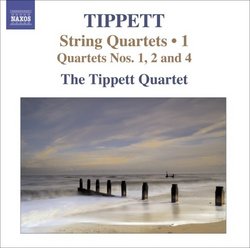| All Artists: Michael Tippett, The Tippett Quartet Title: Tippett: String Quartets, Vol. 1 Members Wishing: 0 Total Copies: 0 Label: Naxos Original Release Date: 1/1/2008 Re-Release Date: 10/28/2008 Genre: Classical Styles: Chamber Music, Historical Periods, Classical (c.1770-1830) Number of Discs: 1 SwapaCD Credits: 1 UPC: 747313049677 |
Search - Michael Tippett, The Tippett Quartet :: Tippett: String Quartets, Vol. 1
CD Details |
CD ReviewsEssential Tippett J Scott Morrison | Middlebury VT, USA | 12/07/2008 (5 out of 5 stars) "Unlike his near contemporary and fellow composer of operas, Benjamin Britten, Michael Tippett is now better known for his non-vocal works. Unfortunately his operas and other vocal music tend to have quirky -- to say the least -- libretti that aren't easily appreciated by the usual opera-goer. His abstract music more clearly reveals what a marvelous composer he was, and along with his piano sonatas, symphonies and several other orchestral pieces such as the Fantasia on a Theme of Corelli, the Concerto for Double String Orchestra and the Triple Concerto, his five string quartets are at the core of his oeuvre. There have been several recordings of all the quartets, including the trail-blazing set by the Lindsays (for whom the last two were written). The present CD, containing Quartets Nos. 1, 2 & 4, by the eponymous Tippett Quartet, is the first release in what will be yet another set of the complete quartets. The Tippett Quartet, formed in 1998, is one of Britain's best new ensembles. As far as I can learn, this is their first CD in wide release.
The First Quartet (written in 1935, extensively revised in 1943) is in three movements. Tippett's original version had four movements but Tippett scrapped the third and fourth movements and wrote a new first movement. That first movement is a dramatic sonata-allegro in Beethovenian mold. The middle movement is in the form of an Elizabethan pavane, a lyrical arch-form, and it leads directly into a vigorous fugal finale whose indebtedness to late Beethoven fugues is evident. Harmonic language in this quartet is tonal, nominally A Major, but with secundal and quartal harmonies. Quartet No. 2 (1941-42) is notable for its abundant lyricism and athletic rhythms, the latter a characteristic of all of Tippett's mature music. It is in four movements, this time with the fourth movement as the weightiest. The first movement is contrapuntal, with dancing rhythms and clever thematic alterations -- for instance, the second theme is an elaboration of the accompaniment for the first theme. The second movement is a slow fugue on a highly chromatic theme. There is a feeling of exhaustion and pain, perhaps related to Tippett's reaction to World War II's atrocities (and to his own brief imprisonment arising from his conscientious objector status). The Scherzo, marked presto, is buoyant, bouncy and yet nervous as well. The finale incorporates themes from the preceding three movements. Tippett says he modeled its drama on the finale of Beethoven's Op. 131 quartet. The quartet ends with a serenely beautiful coda. Quartet No. 4 (1977-78) is late Tippett. It is in one movement that has four distinct sections. It begins with coruscating sul ponticello effects suggesting phosphorescence in a murky wood and a kind of awakening of nature. It moves on to pizzicato and glissando effects, all highly dissonant, that move the argument forward, suggesting growth and efflorescence. The second section continues the hectic pace of the first with marcato and swirling figures. The third section, the quartet's slow movement, is, Tippett indicates, the emotional heart of the quartet. It repeats, in expanded form, the awakening mood of the opening, lyrical and pensive. The finale is vigorous, asymmetric and reminiscent in its gestures of Beethoven's Grosse Fuge. The Fourth Quartet is not easy to assimilate, but with repeated listening both its beauties and its intricate form open up for the listener. I became familiar with these works through the 1970s recordings of the Lindsays Tippett: The 5 String Quartets; these recordings are now showing their age but are nonetheless full of spirit, expert musicianship and, of course, have the imprimatur of the composer. Nonetheless, I find these present recordings to be their equal, and in better sound. I'd not heard the Tippett Quartet before, but they clearly are a group to pay attention to. I am certainly eager to hear their take on the Third and Fifth Quartets when they are released. Scott Morrison" |

